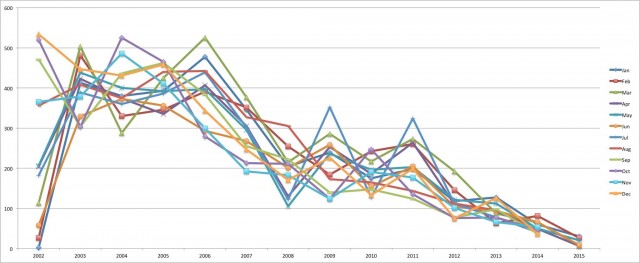The slow death of the list-serves, losing our history to social media
I dwell today on a very interesting trend that I have been observing for some time now. Namely the slow death of the list-serve!
I have seen that I am myself more inclined to use social media sites like Facebook and twitter to connect with the community, than via the medium of the list-serves like gaybombay or gay_bombay.
I attach below a chart that shows the trend in terms of the number of posts per month for the gaybombay list-serve for the period 2002-2015. The chart will clearly show that from its heyday of 2003-08 where there were an average of over 350 posts a month, the numbers have declined drastically today.
The lists had their pros and their cons. A mail is not an instant means of communication. It requires time to assimilate and respond-to. It also requires a more cumbersome infrastructure than the easy apps of most social networking sites. These are the cons and these are probably (at least in my case) the reason for declining use of the list-serves.
But the pro was that mails are easily archivable. The chart below is a record of our history. It is beyond valuable for future historians. The chart in fact is a culling of data that is available as archive on the yahoo groups page. it shows historical developments, it shows trends, and it shows epochal moments. This is not possible with social media like Facebook where most people have now moved. That is not archveable.
This worries me. Post approximately the year 2012-13, we are gradually loosing our history to the ether of instant social media.
Our history needs to be recorded. This is obvious and does not need any reiteration.
I would like our more able brains in the community to give this some thought. What can be done to ensure that an archive of what is getting posted on Facebook is maintained in a form that is readily available to researchers and historians.
I would welcome comments and suggestions, as also who are best placed to take on the responsibility of ensuring whatever comes up as a solution after collective deliberations.





